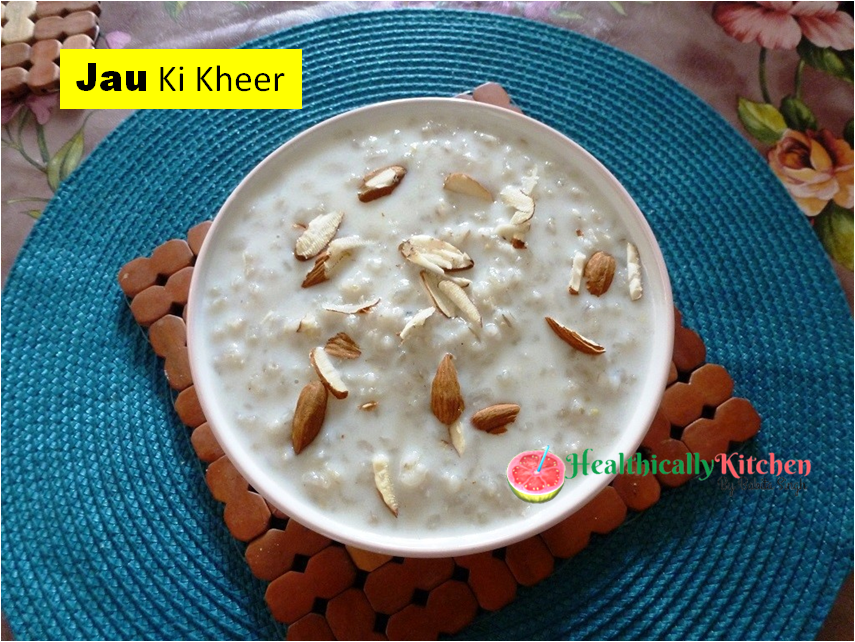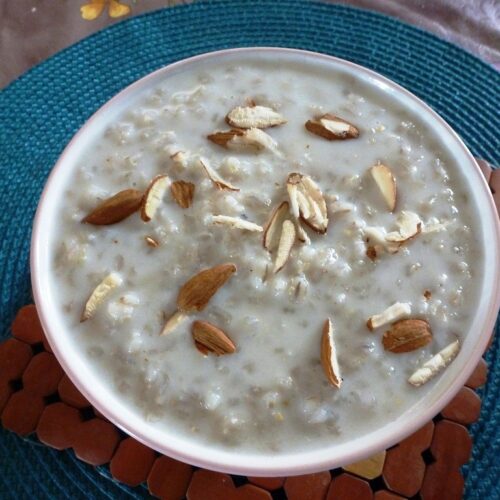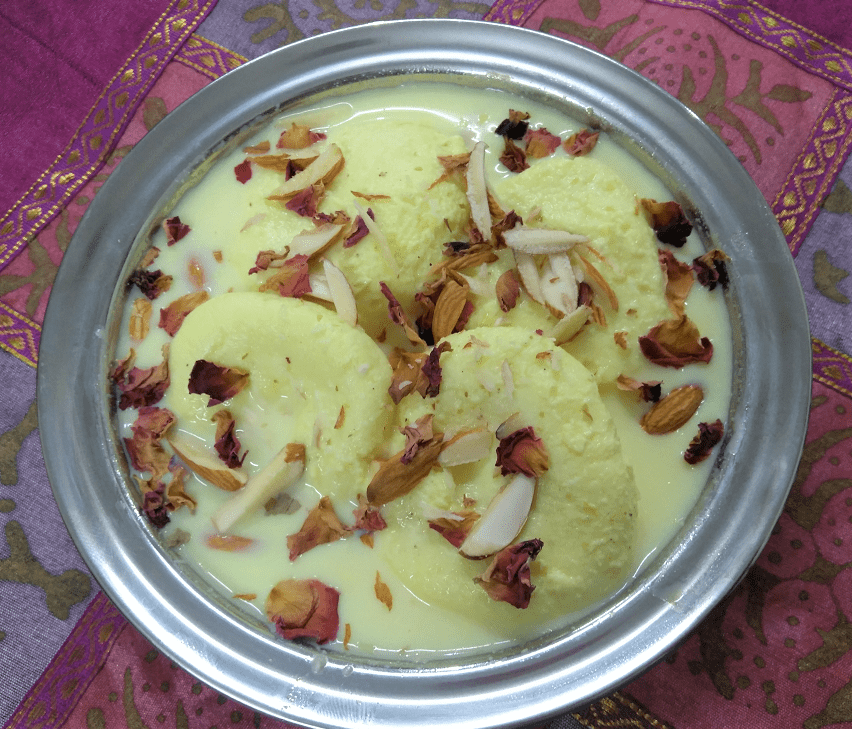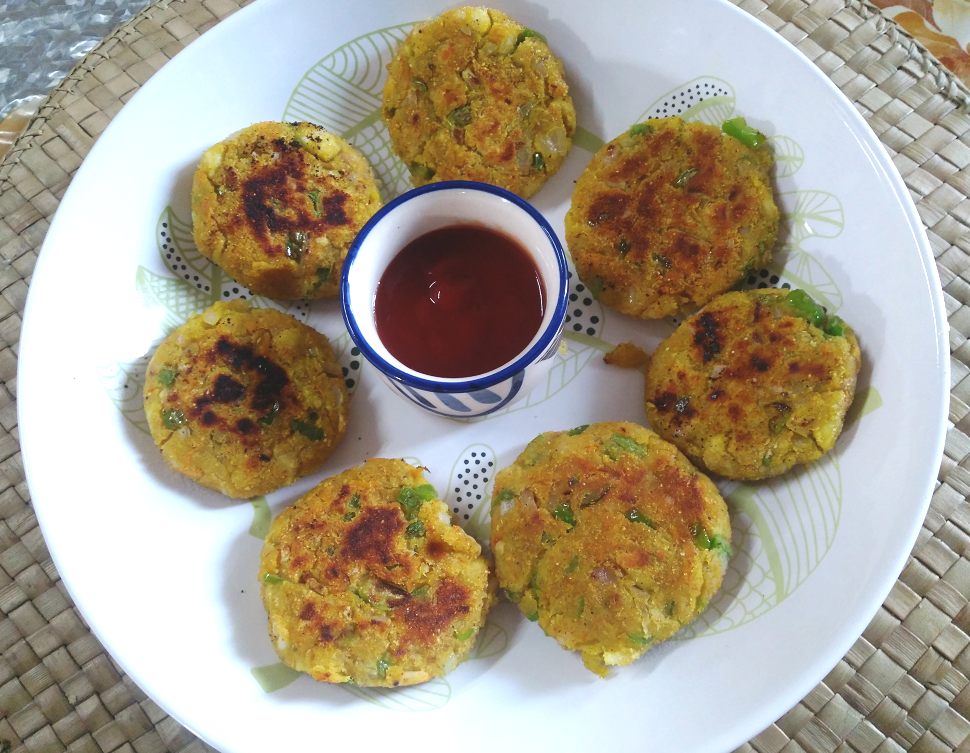Jau Ki Kheer | Summer Special Barley Kheer Recipe | Jau ki kheer is a traditional Indian dessert made with jau (barley), milk, and sugar. It’s a comforting and creamy pudding-like dish that is loved by all ages. This recipe is not only tasty but also a healthy alternative to traditional rice-based kheer.

About the recipe Jau ki kheer | Barley kheer
In this blog post, we’ll guide you through the process of making Jau ki Kheer, using basic ingredients that are easily available in your kitchen. The nutty flavor of barley pairs perfectly with the creamy milk, resulting in a delightful dessert that will leave you craving for more.
The best part about Jau ki Kheer is its simplicity. You don’t need any fancy techniques or elaborate ingredients to make this dessert. With just a few steps, you can create a sweet treat that will impress your family and friends.
Other Kheer recipes you would like to try
Barley, the star ingredient of this recipe, offers several health benefits. It is a good source of dietary fiber, vitamins, and minerals. It can help in digestion, promote heart health, and provide a feeling of fullness.
So, join us on this culinary adventure as we explore the world of Jau ki Kheer. Get ready to indulge in the creamy goodness and the comforting flavors of this delightful dessert. Let’s dive in and discover the simplicity and deliciousness of this Jau ki Kheer recipe!
Health benefits of jau or barley
Jau, also known as barley, is a nutritious whole grain that offers several health benefits. Here are some of the health benefits of including jau in your diet:
- High in Fiber: Jau is an excellent source of dietary fiber. It contains both soluble and insoluble fiber, which can aid in digestion, promote regular bowel movements, and help maintain a healthy digestive system.
- Heart Health: The soluble fiber in jau has been associated with improving heart health. It can help lower cholesterol levels by reducing LDL (bad) cholesterol and promoting HDL (good) cholesterol.
- Blood Sugar Management: Jau has a low glycemic index, which means it causes a slow and steady rise in blood sugar levels. This property can be beneficial for individuals with diabetes or those at risk of developing it.
- Weight Management: Jau is relatively low in calories and high in fiber, making it a filling and satisfying food. Including jau in your meals can help promote satiety, control appetite, and support healthy weight management.
- Nutrient-Rich: Jau is a good source of essential nutrients. It contains vitamins such as vitamin B-complex, vitamin E, and minerals like manganese, selenium, and phosphorus. These nutrients are important for various bodily functions and overall well-being.
- Antioxidant Properties: Jau contains antioxidants that help protect the body against oxidative stress and damage caused by free radicals. Antioxidants are known to have anti-inflammatory properties and may contribute to overall health and disease prevention.
- Gut Health: The fiber content in jau acts as a prebiotic, providing nourishment for beneficial gut bacteria. A healthy gut microbiome is essential for proper digestion, nutrient absorption, and a strong immune system.
- Energy Boost: Jau is a good source of complex carbohydrates, which provide a steady release of energy. Including jau in your meals can help sustain energy levels throughout the day.
It’s important to note that individual nutritional needs may vary, and it’s always recommended to consult with a healthcare professional or nutritionist for personalized advice regarding your specific health conditions or dietary requirements.
Incorporating jau into your diet can be done through various preparations, such as soups, stews, salads, or as a substitute for rice or other grains in dishes. Enjoy the health benefits and versatility that jau has to offer!
Shelf life of Barley Kheer
The shelf life of Jau ki Kheer, or barley kheer, can vary depending on various factors such as storage conditions and the freshness of the ingredients used. Generally, when stored properly, Jau ki Kheer can be refrigerated and consumed within 2 to 3 days.
To maximize its shelf life, follow these guidelines:
Allow the kheer to cool down to room temperature before storing it. Transfer it to an airtight container or a covered bowl. Place the container in the refrigerator as soon as possible to maintain its freshness.
Before consuming refrigerated Jau ki Kheer, visually inspect it for any signs of spoilage, such as an off smell, unusual texture, or mold growth. If you notice any signs of spoilage, it’s best to discard it to avoid any potential foodborne illnesses.
It’s important to note that the texture and taste of Jau ki Kheer may slightly change after refrigeration. The kheer might thicken further, and the flavors may intensify. If desired, you can add a little milk or water and gently reheat the kheer on the stovetop to adjust the consistency before serving.
If you wish to extend the storage time, you can freeze Jau ki Kheer. But I don’t recommend it as the taste and texture of the kheer become changed after freezing. So, prefer to eat i fresh or store it in refrigerator for 1-2 days only.

Step by step preparations of barley kheer
1. Rinse the barley grains well with water to remove any impurities. Soak them in water for at least 8-10 hours or overnight. Seeds become soft if you press them between your fingers. Drain the water before using.



2. In a large saucepan, add 4 cups of water and bring it to a boil. Once it starts boiling, reduce the heat to medium-low and add soaked jau.



3. Cook them on low medium heat with stirring in between till soft but tender. It will take around 10-15 minutes.
4. Now add milk to it and, mix well cook further till they absorbed all the milk and become very soft in texture. This step will take around another 8-10 minutes.



5. At that time add khand and cardamom powder and cook further for 2-3 minutes until the sugar dissolves and the kheer thickens slightly.
6. If you want a thin consistency kheer add more milk and cook till the required consistency is reached.
7. Remove the kheer from heat and let it cool down to room temperature. It will thicken further as it cools. You can serve the kheer chilled or at room temperature, depending on your preference.



8. In a small pan, lightly roast the chopped nuts until they turn golden brown and emit a fragrant aroma. Keep them aside for garnishing.
9. Garnish the Jau ki Kheer with the roasted nuts. You can also add a few saffron strands for additional flavor and a sprinkle of rose petals for an elegant touch.
10. Your delicious Jau ki Kheer is now ready to be served. Enjoy its creamy texture, the nuttiness of the barley, and the delightful flavors of cardamom and saffron. It makes for a comforting and healthy dessert option that can be enjoyed on special occasions or as a sweet treat at any time.
Serving suggestion
Serve it at breakfast or in dinner as meal or as an after meal dessert.
Tips and tricks
Use whole barley grains that are clean, fresh, and of good quality. Avoid using barley that is old or has a musty smell.
- Soaking the barley grains before cooking helps soften them and reduces the cooking time. Soak the grains in water for 2-3 hours or overnight. Drain the water before using the soaked barley in the kheer.
- Cook the soaked barley separately until it becomes tender. This ensures that the grains are fully cooked and have a pleasant texture in the kheer.
- The amount of sugar required may vary based on personal preference and the natural sweetness of the ingredients. Start with a moderate amount of sugar and adjust according to taste. You can always add more sugar if needed.
- Enhance the flavor of the kheer by adding aromatic ingredients like cardamom powder or a pinch of saffron strands. These spices lend a delightful fragrance to the kheer.
- Jau ki Kheer tends to thicken as it cools. If you prefer a thinner consistency, you can add a little milk while reheating the kheer.
- Add a touch of elegance to your Jau ki Kheer by garnishing it with chopped nuts like almonds, pistachios, or cashews. You can also sprinkle a few strands of saffron on top for a vibrant presentation.
- Jau ki Kheer can be enjoyed chilled or at room temperature, depending on your preference. Refrigerate it for a few hours before serving if you prefer it chilled, or serve it warm right after cooking.
- Feel free to experiment with additional ingredients to customize the kheer according to your taste. You can add raisins, grated coconut, or a hint of rose water to enhance the flavors.
- If you plan to store the kheer, follow proper storage guidelines as mentioned earlier. When reheating, do so gently on the stovetop, stirring occasionally to prevent scorching.
Remember, making Jau ki Kheer is a culinary adventure, and you can adjust the recipe to suit your taste preferences. Enjoy the process of cooking and savor the creamy goodness of this delightful dessert!
Recipe card

Jau Ki Kheer | Summer Special Barley Kheer Recipe
Ingredients
- 1 cup whole jau 150 gm
- 4 cup water
- 1 ½ cup toned milk
- 50 gm desi khand
- ½ tsp cardamom powder
- Chopped nuts optional
Instructions
- Rinse the barley grains well with water to remove any impurities. Soak them in water for at least 8-10 hours or overnight. Seeds become soft if you press them between your fingers. Drain the water before using.
- In a large saucepan, add 4 cups of water and bring it to a boil. Once it starts boiling, reduce the heat to medium-low and add soaked jau.
- Cook them on low medium heat with stirring in between till soft but tender. It will take around 10-15 minutes.
- Now add milk to it and, mix well cook further till they absorbed all the milk and become very soft in texture. This step will take around another 8-10 minutes.
- At that time add khand and cardamom powder and cook further for 2-3 minutes until the sugar dissolves and the kheer thickens slightly.
- If you want a thin consistency kheer add more milk and cook till the required consistency is reached.
- Remove the kheer from heat and let it cool down to room temperature. It will thicken further as it cools. You can serve the kheer chilled or at room temperature, depending on your preference.
- In a small pan, lightly roast the chopped nuts until they turn golden brown and emit a fragrant aroma. Keep them aside for garnishing.
- Garnish the Jau ki Kheer with the roasted nuts. You can also add a few saffron strands for additional flavor and a sprinkle of rose petals for an elegant touch.
- Your delicious Jau ki Kheer is now ready to be served. Enjoy its creamy texture, the nuttiness of the barley, and the delightful flavors of cardamom and saffron. It makes for a comforting and healthy dessert option that can be enjoyed on special occasions or as a sweet treat at any time.
Video
Notes
- Soaking the barley grains before cooking helps soften them and reduces the cooking time. Soak the grains in water for 2-3 hours or overnight. Drain the water before using the soaked barley in the kheer.
- Cook the soaked barley separately until it becomes tender. This ensures that the grains are fully cooked and have a pleasant texture in the kheer.
- The amount of sugar required may vary based on personal preference and the natural sweetness of the ingredients. Start with a moderate amount of sugar and adjust according to taste. You can always add more sugar if needed.
- Enhance the flavor of the kheer by adding aromatic ingredients like cardamom powder or a pinch of saffron strands. These spices lend a delightful fragrance to the kheer.
- Jau ki Kheer tends to thicken as it cools. If you prefer a thinner consistency, you can add a little milk while reheating the kheer.
- Add a touch of elegance to your Jau ki Kheer by garnishing it with chopped nuts like almonds, pistachios, or cashews. You can also sprinkle a few strands of saffron on top for a vibrant presentation.
- Jau ki Kheer can be enjoyed chilled or at room temperature, depending on your preference. Refrigerate it for a few hours before serving if you prefer it chilled, or serve it warm right after cooking.
- Feel free to experiment with additional ingredients to customize the kheer according to your taste. You can add raisins, grated coconut, or a hint of rose water to enhance the flavors.
- If you plan to store the kheer, follow proper storage guidelines as mentioned earlier. When reheating, do so gently on the stovetop, stirring occasionally to prevent scorching. Remember, making Jau ki Kheer is a culinary adventure, and you can adjust the recipe to suit your taste preferences. Enjoy the process of cooking and savor the creamy goodness of this delightful dessert!
My latest video
Try this delicious summer special jau ki kheer recipe at home and let me know about your outcomes in the comments section below or tag #healthicallykitchen on instagram. If you like this recipe, don’t forget to share it with your friends and family give us a 5 star rating.






